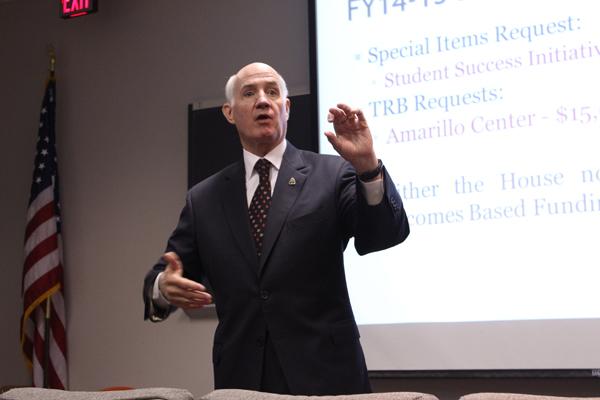
A Town Hall Meeting was held on Thursday, March 28, in which the budgets for the years 2014-2015 were discussed. Dr. J. Patrick O’Brien, president of WTAMU, spoke at the meeting, which was open to all faculty, staff and students. Some key topics were brought up during the meeting that will have an effect on the entire campus.
One point that Dr. O’Brien spoke on was the loss of budget money coming from the state in the next couple years. If the current markup of the budget bill is passed in the State Senate, the school will lose $1.3 million per year over the next two years. Dr. O’Brien attributes this to the lack of growth in the school.
“We need to grow faster,” Dr. O’Brien said during the meeting. “We only have a 62 percent retention rate in students going from freshmen to sophomores. We also lost 18 percent of our students going from fall to spring. We have to change this by intervening with our at-risk students.”
The campus Math and Writing Labs were also discussed during last week’s meeting. Demand for these labs has grown dramatically over the past year, but they are currently not adequately budgeted. Dr. O’Brien made it clear that these labs will be budgeted for in the coming years.
“I think we should figure out a way to fund it because those are some of the most crucial skills we will learn for our college careers,” Oliver Holmes, a sophomore Spanish major, said.
Dr. O’Brien also announced that there will be four new faculty positions added. The Math, Business, Communication and Communications Disorders Departments will be adding a new faculty member in the future. Many of the basic classes in Math, Business and Communication have recently been taught by part-time staff rather that full-time faculty. Dr. O’Brien hopes to change this by adding these new positions.
“In my opinion, if you’re teaching something part-time, it’s not necessarily your number one priority,” Alison Mercer, a freshman Sociology major, said. “The part-time teachers have other time commitments, whether it be another job or family or even continuing their education which all probably comes first. These are core classes at WT. Everyone has to have them, yet we have teachers that may not be completely dedicated to these students learning, which just hurts the students.”
Many Communications Disorders students who wanted to go to Graduate School were met with disappointment when they applied to continue their education. Currently, there are not enough faculty teaching in that department to allow many students into the graduate program, which is why the new position is being added.
The school has also been pressured by the Texas A&M System to offer a $10,000 degree to its students. The $10,000 refers to how much the school charges the students for that degree, not the amount it costs the school to provide that degree.
“If we do a $10,000 degree, then it will be a real $10,000 degree,” Dr. O’Brien said Thursday. “Some schools are already doing this, but they say if you take dual credit and AP classes in high school, then go to a junior college for three years, then come to us we can give you a degree for $10,000. I’m not going to do that.”
The school has also been asked to provide the students with a Four-Year Tuition Guarantee. That is, they will pay a certain amount for four years, but with how the budget changes from the state and the TAMU System, this is hard for the school to be able to do. If they anticipate the budget change and raise the tuition rate they tell students by just a little, they would be able to give the students this guarantee.
Privatization was also an important point during the Town Hall Meeting. TAMUS would like to outsource some University departments, such as the Information Technology Department. This is not a certainty as of yet, however Dr. O’Brien did inform those at the meeting that it is a possibility.
“If it does happen, I don’t want it changing the culture of WT,” Dr. O’Brien said.
The budget process still has quite a few steps to go through before anything is decided for certain. Internal WTAMU Budget Hearings will be April 15-17, and then shortly after that on May 1-2, the TAMUS Board of Regents will meet to discuss tuition and fee changes. On May 27, the current legislative session will end, and the University will know how much money the state will provide. After that, the school will submit a budget to the TAMUS in June. Then in August the TAMUS Board of Regents will meet again to consider the budgets.
With so many more steps to go through before a final budget is approved, Dr. O’Brien made it clear in the Town Hall Meeting that nothing is set in stone, but all the information he provided was the best estimate as to what will happen.













